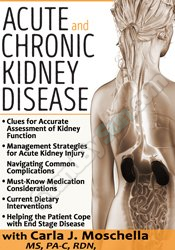Carla J. Moschella - Acute and Chronic Kidney Disease

- Clues for Accurate Assessment of Kidney Function
- Management Strategies for Acute Kidney Injury
- Navigating Common Complications
- Must-Know Medication Considerations
- Current Dietary Interventions
- Helping the Patient Cope with End-Stage Disease
If you are like many healthcare professionals, you might find the complexity of renal disease intimidating and the management strategies confusing. In addition, you have the task of helping patients and families cope with a debilitating condition and a high rate of non-compliance. If this sounds familiar, then don’t miss the opportunity to join expert, Carla Moschella, MS, PA-C, RDN, for this program loaded with practical information designed to increase your confidence when caring for today’s complex renal patient.
Carla will present the latest information on acute and chronic kidney failure, including treatment recommendations that lead to the best possible patient outcomes. You will gain more knowledge on the causes, complications, medications, and dietary recommendations, and leave with an improved understanding of all aspects of kidney function and disease that is immediately applicable to your clinical practice.
OUTLINE
Accurately Assessing Kidney Function
- Interpreting Lab Tests
- Urinalysis
- Normal Findings
- Proteinuria
- Hematuria
- Indications for Imaging Studies
- Ultrasound
- CT Scan
- Angiogram
- IVP
Recognizing the 5 Stages of Chronic Kidney Disease (CKD)
- Screening Recommendations
- The Possible Cause
- Accurate Staging
- Common Complications Including:
- Hyperkalemia
- Hyperphosphatemia
- Anemia
- Acidosis
- Malnutrition
- Management Strategies
- Recommended Medications
- Dietary Restrictions
- Predicting Outcomes
- Rate of Decline
- Onset of ESRD
The Kidneys and Hypertension
- Goals for Blood Pressure Control
- Choosing the Appropriate Medications
- Diuretics
- ACE Inhibitors
- ARBs
- Calcium Channel Blockers
- Beta & Alpha Blockers
- Hypertensive Nephrosclerosis
- Lab & Imaging Findings
- Prognosis
The Kidneys and Diabetes
- Urinalysis
- Screening & Monitoring
- Frequency of Testing
- Diabetic Nephropathy
- Controlling BP & Glucose
- Recommendations for Treatment
Acute Kidney Injury (AKI)
- Deciphering the Cause
- Medications
- Contrast Dye
- Shock
- Glomerulonephritis
- Urinary Tract Obstruction
- Reversible vs. Irreversible
- Identifying the Signs & Symptoms
- Monitoring the Patient
- Appropriate Interventions
Kidney Disease & Nutrition
- Diet for CKD & AKI
- Dietary Interventions:
- Sodium
- Phosphorus
- Potassium
- Protein
- When to Use & Why
End-Stage Renal Disease
- Hemodialysis & Access Issues
- Peritoneal Dialysis
- Transplant
- Cadaveric vs. Living Donor
- Pre-Transplant Considerations
- Post-Transplant Care
- Complications of Therapy
- Infection
- Rejection
- Cancer
- Psychosocial Support
- Transitioning to Palliative Care or Hospice
Patient Education & Compliance
- Strategies to Prevent Non-Compliance
- Cultural Considerations
- Avoiding Re-Admission
- Incorporating the Family
Would you like to receive Carla J. Moschella - Acute and Chronic Kidney Disease ?
OBJECTIVES
- Recognize which patients are at risk for developing chronic kidney disease (CKD).
- Assess patients with CKD by analyzing risk factors, the urinalysis, and labs.
- Explain the five stages of CKD, their associated complications, and their treatment and prognosis.
- Appraise how to prepare patients for renal replacement therapy (dialysis and/or transplant).
- Discuss how the kidneys control blood pressure, and understand the roles the various classes of anti-hypertensive medications play in the treatment of hypertension.
- Choose the best method of patient education to promote compliance with dietary restrictions.